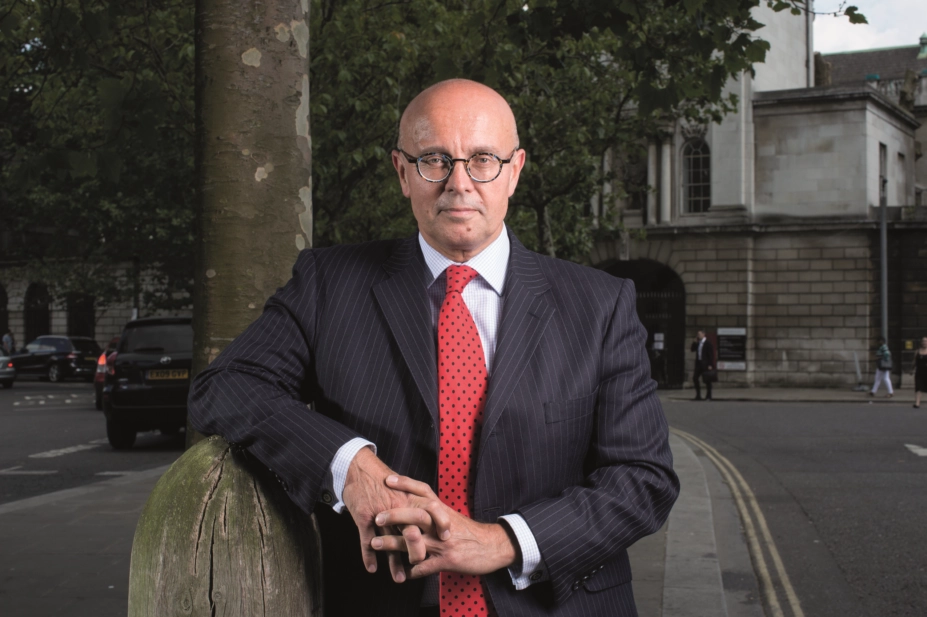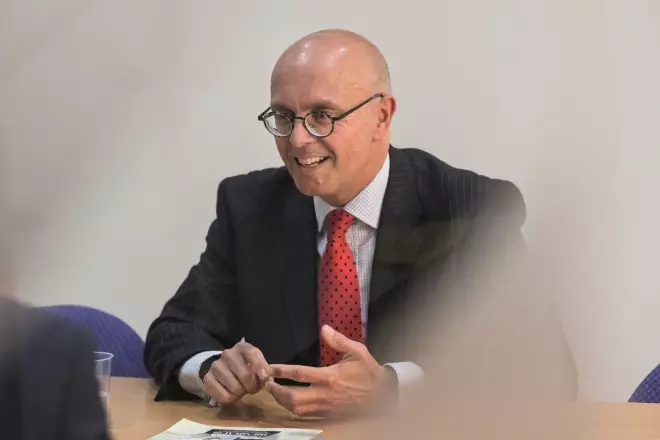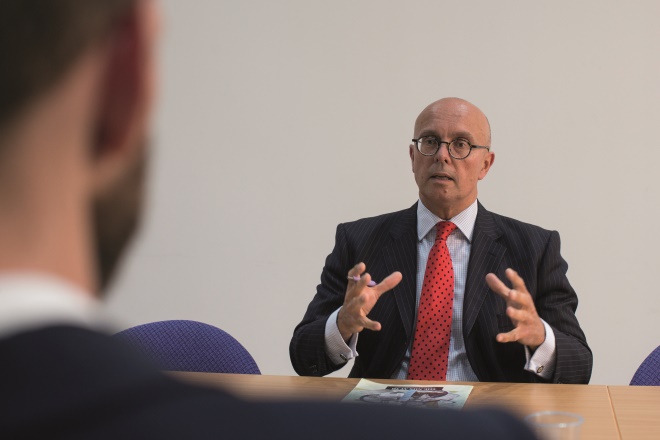
Jeff Gilbert
Ministers had better watch out when they first meet community pharmacy’s chief negotiator. Simon Dukes has more than a shade of the Bond villain about him, as he leaps up the steps of the white-washed basement lair housing the hard-working Pharmaceutical Services Negotiating Committee (PSNC) team, in a sharply tailored pinstriped suit.
The Pharmaceutical Journal interviews Dukes a few weeks after he has taken on the top job at the PSNC and he is well briefed about the troubles community pharmacies are having. Previously chief executive of the fraud-prevention service Cifas and deputy director of the Centre for the Protection of National Infrastructure, he is not an obvious choice to front negotiations for pharmacy.
But he clearly wants to draw a line under the more combative style of his predecessor, Sue Sharpe, and his experience of persuading government to take a neglected sector more seriously could come in handy.
What makes you qualified for this job?
I’m coming from outside. I’m not a pharmacist, but I hope I bring something different. I’ve spent 25 years in government, so I know how large government departments work. I’ve been employed not for my pharmaceutical knowledge, but for my judgement.
I’ve been employed not for my pharmaceutical knowledge, but for my judgement
I can’t imagine there are many parallels between fraud and pharmacy.
Well, you’d be surprised. Not on the fraud side, I hasten to add [laughter]. I’ve spent the past four-and-a-half to five years as the chief executive of Cifas, the fraud-prevention agency and, yes, on the surface there is absolutely no parallel. But it’s a membership organisation with over 400 companies from the biggest retail banks through to very small organisations coming together for a single purpose. They have to leave competition at the door and think about the wider issues of financial crime. I played a big role in persuading the Home Office and the Cabinet Office, in particular, to take fraud seriously.
I want a fresh approach to make sure that we are working for the benefit of patients and government
Did you manage that?
Yes. And you now hear — if you go back and do an archive search — you’ll hear certainly the past two home secretaries, Theresa May and Amber Rudd, talking about fraud prevention as important.
Certainly getting the government to listen is a problem for pharmacy.
Getting the government to listen and looking to the future. Just as fraud is customer-focused, community pharmacy is also very much patient-focused.
Will there be a new approach to the Pharmaceutical Services Negotiating Committee under your leadership?
Sue Sharpe has moved on and we have very different styles. My style is very much collaborative — I want to work with the government. I want a fresh approach in terms of our relationship to make sure that we are working with them for the benefit of patients and the government. So yes, I do see it as a fresh start.
Do you think the judicial review was a mistake?
It was something that was agreed by the committee in 2016 and that was a unanimous decision. Clearly, I was no part of any of that; I come in now. The appeal’s been heard, we will get the result at some point. That was the past, I’m now looking to the future. From my perspective, it’s not really relevant for the future. Whatever the outcome.

Source: Jeff Gilbert
I’m not sure quite what you’re saying — are you washing your hands of it?
No, we are where we are. I can’t change it. Whatever the outcome of the appeal, that’s not going to affect the way I approach negotiations. We need to move on now and start talking and looking at how we can get the best possible deal for community pharmacy. I can’t say that if I was in Sue’s position back in 2016, we’d being doing the same thing. But the fact is that it’s a reality.
Have you met ministers yet?
I am doing the rounds; as you’d expect, speaking to a whole variety of stakeholders.
Have you been in a room with Steve Brine, at all?
[Laughter] As I say, I’m doing the rounds.
Okay, so not yet.
I’m doing the rounds.
Does that mean you can’t tell me or you haven’t?
I think in the first 50 days you’d expect me to see as many people as possible. [The PSNC press office confirmed a few days later that Dukes had contacted the minister and hoped to arrange a meeting with him soon.]
Moving on to the new community pharmacy contract — are you hoping to have it in place in 2019?
We are very much in the hands of the government; when we receive the mandate we can make a start. My personal view is that we’re not going to get anything until we get a result from the judicial review, so that is causing a delay.
My father was a small business owner … I know the pressures that independent pharmacies are under
Is there not a risk by looking at a service-based kind of contract that, once again, the core role of pharmacy is overlooked and defunded? How can you ensure that doesn’t happen?
Pharmacy has got to change. The pressures from societal changes, environmental changes and technology means that we have to look at ways of securing this vital resource for communities. And having a more service-based contract is the way to do that. The detail will be important, clearly, in the terms of negotiation and having a proper reimbursement for community pharmacists for those services — that’s what we’ve got to aim for. We’ve got to take the role of community pharmacy as a whole, and there are vital services being performed right now by community pharmacists. So you could say you need to defend those as well. But it’s about getting proper reimbursement for those services, and dispensing as well, of course.
It’s a very tough environment out there for community pharmacy, with a number of closures since the cuts were announced. Are you foreseeing any more closures?
We genuinely get and sympathise with the pressures that community pharmacy is under at the moment. That perfect storm of funding cuts, the margin reducing — as well as the clawback of £15m per month currently — is causing real cash-flow issues for many. I do not want people to think that somehow we don’t understand that, because we absolutely do. I come from a family business myself; my father was a small business owner, and I know the pressures that independent pharmacies are under in terms of trying to keep making ends meet, the pressures on family as a result of that, working all the hours there are, the pressures on mental health, and wider in terms of sickness and absenteeism and stress. That makes us even more determined to focus on the best possible deal that we need to get for community pharmacy, and that the services that we’re talking about are deliverable.

Source: Jeff Gilbert
Do you foresee the situation getting worse if nothing changes?
We’re talking about a commodities market. We can’t foresee how that’s going to go. All I can say is that if the current situation continues, clearly the cash-flow issues, and the fiscally tight environment that community pharmacies are under, are going to continue.
Medicine shortages are a massive issue — when I talk to community pharmacists, they always raise it as something cutting into their bottom line. Do you have a sense of what needs to change so there’s a better system for everyone?
Community pharmacists do a fantastic job of keeping the price of medicines low, but at what cost to them? We get regular reports about some pharmacists effectively subsidising the government from the fact that they’re selling medicines at a loss. I don’t think we’ve got any quick fix, but we need to sit down with the government to have those conversations. This funding is fundamental to the income for a community pharmacy, so we are going to have to think very, very carefully about what that’s going to look like and the potential, unintended consequences for pharmacy and the patient. But that’s something we’ve got to look at.
In a year’s time, I’d like the positioning of community pharmacy in our healthcare system to be different
This is a question a community pharmacist asked me to put to you: how do you balance the interests of independents with multiples, particularly those with wholesaler arms, as they have often quite different interests from an independent pharmacist?
The members of the committee are there to represent community pharmacy in their sub-sector and they’re not there to represent their organisations. Everyone has an equal voice. It doesn’t matter whether you happen to be employed by a large multiple, or you have a single pharmacy. The makeup of the committee is carefully weighted so it represents the community pharmacy sector as a whole — from my observation at the last meeting in May 2018 it works and they are genuinely working collaboratively. My first proper meeting will be in [July].
In a year’s time, what do you hope to have achieved?
A great deal for community pharmacy. A sustainable one, and one that is looking to the future for years to come. Something that we’ve worked on together with government for the benefit of patients, government and community pharmacy. Community pharmacy is a bit inward looking; people don’t seem to talk about their successes. In a year’s time, I’d like the positioning of community pharmacy in our healthcare system — and this isn’t just PSNC, this is working with all those other trade bodies and organisations, and the government and others — to be different, so that the general public regards community pharmacy actually in its rightful place as part of the healthcare system. We’ve got this amazing resource that provides the societal safety net for people who might be excluded from other access to healthcare — they can walk in from the high street and access the NHS. We need to maintain that; we need to ensure that it’s sustainable for the future.


